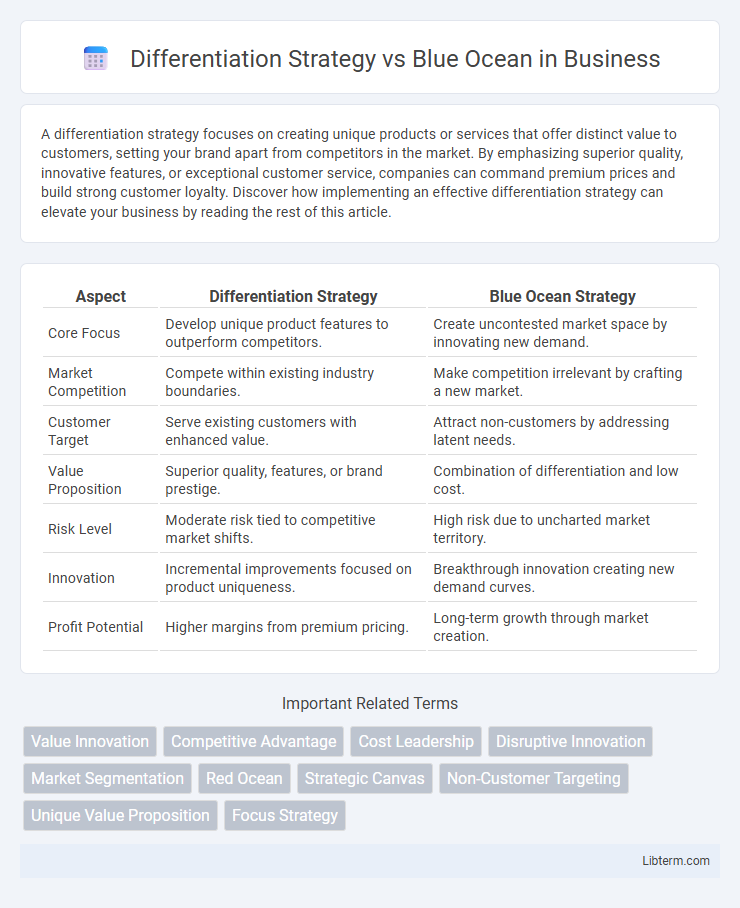A differentiation strategy focuses on creating unique products or services that offer distinct value to customers, setting your brand apart from competitors in the market. By emphasizing superior quality, innovative features, or exceptional customer service, companies can command premium prices and build strong customer loyalty. Discover how implementing an effective differentiation strategy can elevate your business by reading the rest of this article.
Table of Comparison
| Aspect | Differentiation Strategy | Blue Ocean Strategy |
|---|---|---|
| Core Focus | Develop unique product features to outperform competitors. | Create uncontested market space by innovating new demand. |
| Market Competition | Compete within existing industry boundaries. | Make competition irrelevant by crafting a new market. |
| Customer Target | Serve existing customers with enhanced value. | Attract non-customers by addressing latent needs. |
| Value Proposition | Superior quality, features, or brand prestige. | Combination of differentiation and low cost. |
| Risk Level | Moderate risk tied to competitive market shifts. | High risk due to uncharted market territory. |
| Innovation | Incremental improvements focused on product uniqueness. | Breakthrough innovation creating new demand curves. |
| Profit Potential | Higher margins from premium pricing. | Long-term growth through market creation. |
Introduction to Differentiation Strategy and Blue Ocean
Differentiation strategy emphasizes creating unique products or services to stand out in a competitive market by focusing on quality, innovation, and customer experience. Blue Ocean strategy seeks to create uncontested market space by identifying and developing new demand, making competition irrelevant through value innovation. Both approaches drive business growth but differ in their core focus--differentiation targets existing markets, while Blue Ocean targets unexplored markets.
Defining Differentiation Strategy
A differentiation strategy involves creating unique product features, superior quality, or exceptional service that distinguish a company from its competitors within an existing market. Companies adopting this strategy emphasize innovation, brand reputation, and customer experience to achieve competitive advantage and justify premium pricing. Unlike Blue Ocean strategy, which seeks untapped market space, differentiation focuses on outperforming rivals by delivering distinct value in competitive industries.
Understanding Blue Ocean Strategy
Blue Ocean Strategy emphasizes creating uncontested market space by innovating value rather than competing within existing industry boundaries, which contrasts with Differentiation Strategy that focuses on distinguishing products within competitive markets. By redefining market boundaries and targeting untapped customer needs, Blue Ocean Strategy enables businesses to unlock new demand and achieve high growth without direct rivalry. This approach relies on value innovation, combining cost leadership with differentiation to open blue oceans of profitable opportunities.
Core Objectives: Differentiation vs Blue Ocean
Differentiation strategy focuses on creating unique products or services to gain competitive advantage by appealing to specific customer needs, emphasizing innovation, quality, and branding. Blue Ocean strategy aims to create uncontested market space by redefining industry boundaries, minimizing competition through innovation and value creation. Both strategies target growth, but differentiation competes in existing markets, while Blue Ocean pursues entirely new demand and market opportunities.
Key Principles and Frameworks
Differentiation strategy focuses on creating unique products or services that provide superior value to customers, leveraging distinctive features and brand reputation to achieve competitive advantage within existing markets. Blue Ocean strategy emphasizes the creation of new, uncontested market spaces through innovation and value innovation, aiming to make competition irrelevant by simultaneously pursuing differentiation and low cost. Frameworks like Porter's Generic Strategies guide differentiation efforts through focus, uniqueness, and premium pricing, whereas the Blue Ocean strategy employs tools such as the Four Actions Framework and Strategy Canvas to systematically identify and capture untapped demand.
Value Innovation: Comparing Approaches
Value innovation in Differentiation Strategy emphasizes creating unique product features that justify premium pricing within existing market boundaries, targeting competitors directly. Blue Ocean Strategy redefines market space by simultaneously pursuing differentiation and low cost, making competition irrelevant through the discovery of untapped demand. Both approaches prioritize value creation but differ fundamentally in market scope and cost management to achieve competitive advantage.
Market Competition vs Market Creation
Differentiation strategy emphasizes outperforming competitors by offering unique products or services within existing markets, intensifying market competition through distinct value propositions. Blue Ocean strategy focuses on creating new, uncontested market spaces where competition is irrelevant, driving growth by pioneering demand rather than fighting over established customers. Companies applying Blue Ocean seek innovation that opens untouched markets, while differentiation strategies deepen competitive advantage in crowded industries.
Risks and Challenges of Each Strategy
Differentiation strategy faces risks such as high costs associated with innovation and product uniqueness, potential imitation by competitors, and shifting consumer preferences that may erode competitive advantage. Blue Ocean strategy confronts challenges including uncertainty in untested markets, significant investment in creating demand, and the difficulty of sustaining uncontested market space due to eventual competition entry. Both strategies require careful market analysis and continuous adaptation to mitigate risks and capitalize on growth opportunities.
Case Studies: Differentiation vs Blue Ocean Success Stories
Apple's differentiation strategy focuses on premium design and seamless user experience, creating a loyal customer base in the competitive tech industry. In contrast, Cirque du Soleil exemplifies a Blue Ocean strategy by reinventing live entertainment, blending circus arts with theater to open an uncontested market space. Tesla combines both approaches by differentiating through cutting-edge electric vehicle technology while pioneering a Blue Ocean in sustainable transportation and energy solutions.
Choosing the Right Strategy for Your Business
Choosing the right strategy for your business hinges on understanding market conditions and competitive dynamics; a Differentiation Strategy emphasizes creating unique products or services within existing markets to build competitive advantage, while the Blue Ocean Strategy involves innovating new markets with uncontested demand. Assess market saturation, customer pain points, and resource capabilities to determine whether leveraging differentiation for market share or pioneering a blue ocean for growth aligns better with business goals. Data-driven analysis of target audience behavior and industry trends ensures that the chosen strategy maximizes value creation and sustains long-term profitability.
Differentiation Strategy Infographic

 libterm.com
libterm.com